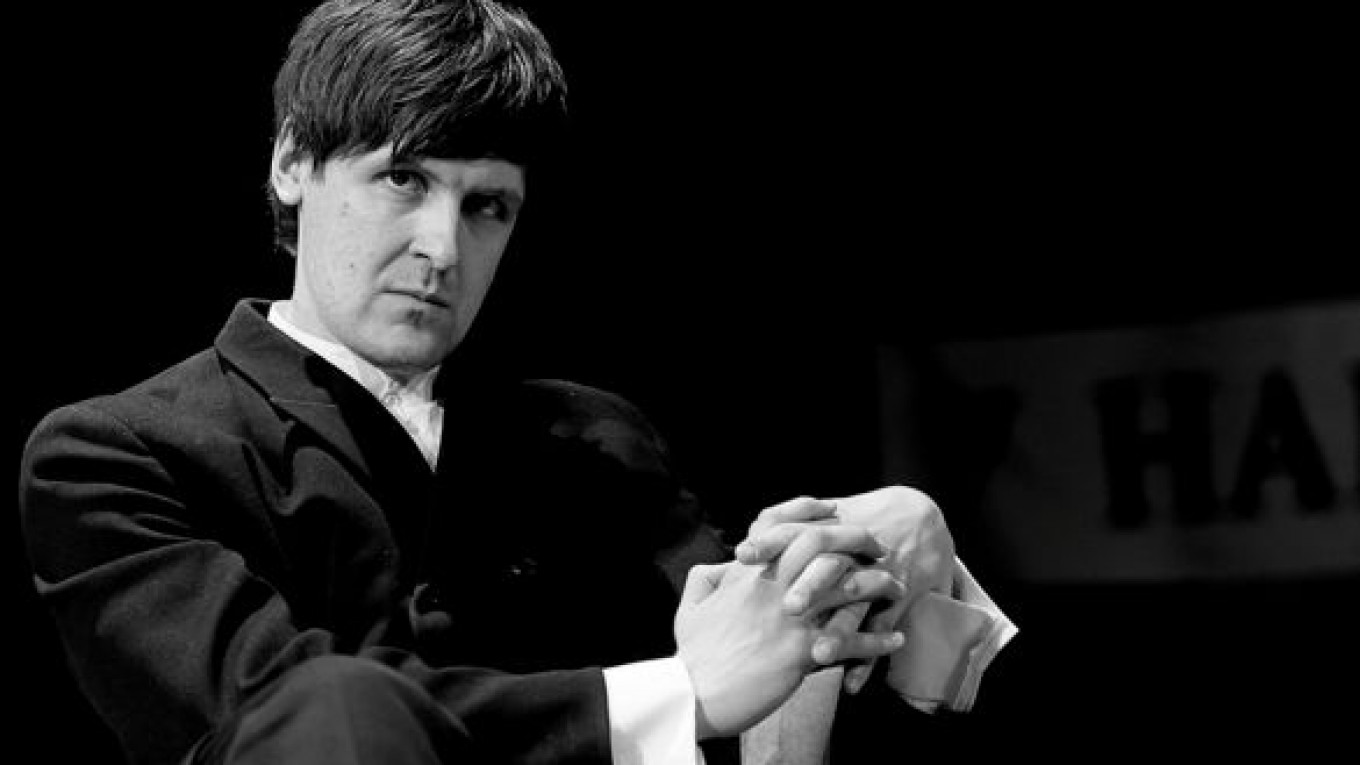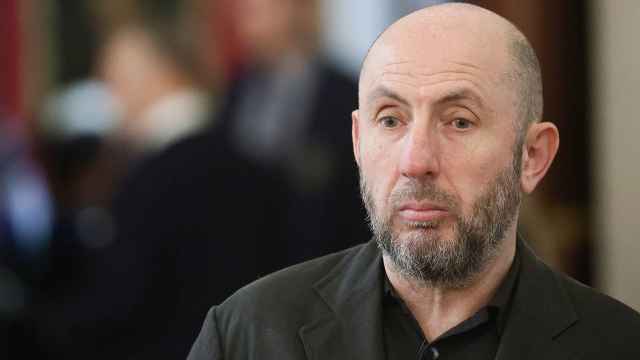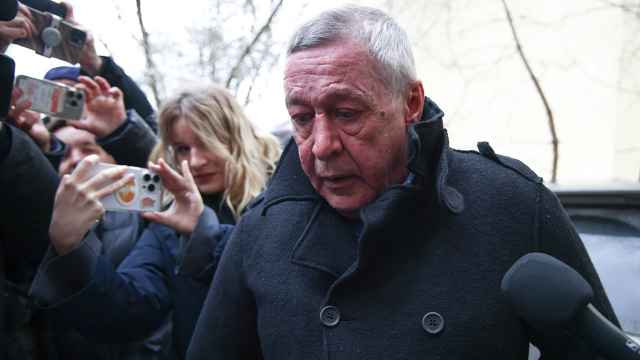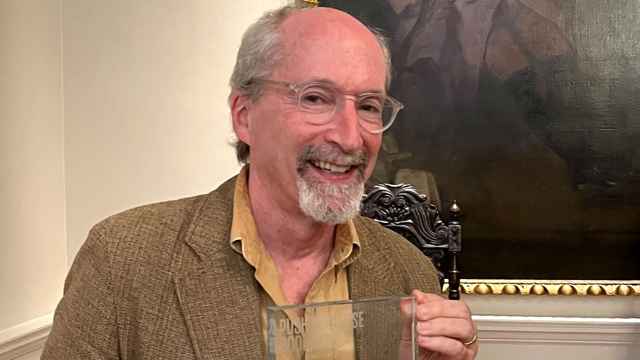It was a proper homecoming.
Yury Lyubimov last worked at the Vakhtangov Theater in the early 1960s, before he founded the Taganka Theater, which brought him international fame. What better place to return to than the Vakhtangov following his rancorous break with the troupe at the Taganka last summer?
There had been rumors Lyubimov would put together a company of stars and produce an independent adaptation of Fyodor Dostoevsky's novel "Demons," but the return to home territory made so much more sense. I don't know the details, but surely artistic director Rimas Tuminas was behind the effort to bring Lyubimov to the Vakhtangov. It was a move bolstered by heart and wisdom, and backed by an unerring sense of history.
Indeed, when Lyubimov strolled into the hall to take his usual seat facing the stage before the premiere of "Demons" last week, applause crackled through the audience like wildfire. In seconds it grew into a prolonged standing ovation that was stopped only when Lyubimov began calling for Natalya Kuzina, his stage manager, to see if the show was ready to go.
What transpired on stage is more problematic.
At just under four hours running time, this tale about hard-hearted revolutionaries, misguided intellectuals, thickheaded bureaucrats and chattering denizens of society is witheringly long. Lyubimov's style of cutting text and story into episodic scenes sometimes reminds one of what happens when cars pile up on a fogbound highway. It becomes difficult to keep track of what is happening.
Yet there is so much of value in this production that it would be hard to call it anything other than a triumphant homecoming.
The troupe at the Vakhtangov was clearly energized by the opportunity to work with one of the most distinctive Russian directors of the last half-century. They brought a sense of excitement to their work that was lacking in recent years at the Taganka. Moreover, Lyubimov, who is 94, was willing and able to be inspired by new collaborators. This was obvious in some actors' performances.
Yevgeny Kosyrev offered a brilliant, frequently show-stopping, comic performance of the self-sure, poetry-spouting, but groveling, Captain Lebyadkin. Maria Berdinskikh provided comedy and heartfelt sincerity in her interpretation of Lebyadkin's hobbled, but sharp-minded, sister. As the dark and troubled Stavrogin, the central "demon" among a group of fuzzy-headed nihilists, Sergei Yepishev provided a nuanced performance that mixed humor with intelligence and evil indifference.
Interestingly, Lebyadkin is perceived as one of the most heinous figures in Dostoevsky's novel, but in the version put forth by Kosyrev and Lyubimov he is so vivacious and funny that he emerges as a highly paradoxical, even tragic, figure.
It is a mark of this production that details come through more clearly than the overall picture. While one may struggle to follow the connections between the numerous characters, the chaos caused by their interactions is as recognizable as a modern-day news report.
Weak-willed liberals (Yury Shlykov's Stepan Verkhovensky) cross paths with do-gooder society ladies (Yekaterina Simonova in the role of Stavrogin's mother), lapsed liberals (Artur Ivanov's Shatov), liberals foaming at the mouth (Yury Kraskov as Verkhovensky's son Pyotr), headstrong beauties (Yevgenia Kregzhde's Yelizaveta Tushina) and a host of others.
Calling his production a "concert performance," Lyubimov makes little effort to place his characters and events in a specific space. A pianist sits at center stage and provides live musical accompaniment for the entire performance. Actors sit on a raised platform at the back of the stage, standing when their names are mentioned, or stepping forward to participate in scenes.
"Demons" carries plenty of social and political satire. The name of the gossip-monger Liputin is occasionally spoken with the first syllable swallowed, to great comic effect. Phrases such as "a liberal with no goal is possible only in Russia," or, "how can you build a bridge at the same time that you plan to destroy everything?" are delivered as personal messages to the audience and are greeted with healthy laughter.
Comedy, as is always true of Dostoevsky, is crucial. Lyubimov presents a jocular picture of a society wracked by intrigue, ambition, back-biting, philosophizing, breast-beating, ignorance and selfishness. The dark side of that is that it destroys personalities, kills the weak, and fosters little that is truly progressive.
I cannot deny that there were times I lost touch with this long, chaotic production. But at its best, which it often was on opening night, "Demons" is an incisive modern take on a classic view of Russian society and politics.
"Demons" (Besy) plays Sat. and April 21 at 7 p.m. at the Vakhtangov Theater, 26 Arbat. Metro Smolenskaya. Tel. 499-241-1679. . 3 hours, 45 minutes.
A Message from The Moscow Times:
Dear readers,
We are facing unprecedented challenges. Russia's Prosecutor General's Office has designated The Moscow Times as an "undesirable" organization, criminalizing our work and putting our staff at risk of prosecution. This follows our earlier unjust labeling as a "foreign agent."
These actions are direct attempts to silence independent journalism in Russia. The authorities claim our work "discredits the decisions of the Russian leadership." We see things differently: we strive to provide accurate, unbiased reporting on Russia.
We, the journalists of The Moscow Times, refuse to be silenced. But to continue our work, we need your help.
Your support, no matter how small, makes a world of difference. If you can, please support us monthly starting from just $2. It's quick to set up, and every contribution makes a significant impact.
By supporting The Moscow Times, you're defending open, independent journalism in the face of repression. Thank you for standing with us.
Remind me later.







